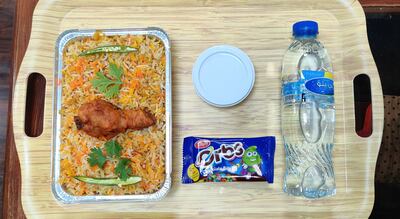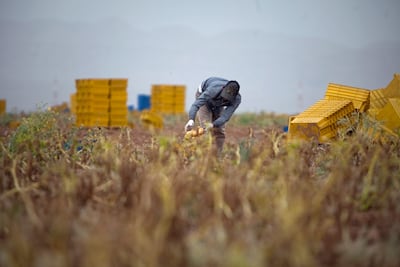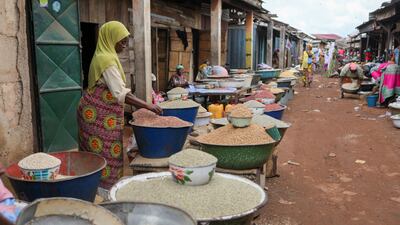Situated at a global crossroads, the UAE has long been a hub for the flow of trade, people and ideas. The nation has acted as a natural incubator for innovation, thriving on diverse cultures and perspectives. Today, bolstered by modern, tech-friendly policies and regulations, the Emirates is ranked by the Global Innovation Index as the most innovative economy in the Arab world for the seventh consecutive year. We are a young, stable, future-focused nation that has become a prime testing ground for new technologies as we tackle some of the biggest challenges of our time.
Food security is one of those challenges. As a desert nation with significant water scarcity, food security has always been an issue of concern and government attention. Climate change, the Covid-19 pandemic and wider geopolitical pressures have accelerated our focus on this core issue.
The UAE National Food Security Strategy, launched by Mariam Al Mheiri, Minister of Climate Change and Environment and Minister of State for Food Security, in November 2018, responded to these challenges by prioritising a better balance between locally produced and imported food and by leveraging new technology to boost domestic yields and reduce food waste.

One element of our food security strategy is to catalyse partnership and innovation, seeking out the world’s leading scientists, technologists and innovators, and directing their efforts to the difficult challenges at hand here in UAE. This has been the objective of the FoodTech Challenge (FTC), a global competition that is now in its second year.
This year’s FTC inspired 667 applications from 79 countries, all of which put forward proposals on how to enhance various aspects of the UAE’s food security, which will have relevance far beyond the country. An emphasis was placed on innovations related to two tracks that are critical locally and globally: “Food Production” to ensure the consistent and sustainable availability of food and to explore next-generation, nutrient-rich alternatives, and “Food Loss and Waste” to reduce burdens on the food supply chain more broadly. Entrants included students, scientists, farmers, university professors, computer programmers, imaging specialists and more, all applying their creativity and brainpower to generating solutions to our shared challenges.
We have now selected four winners whose ideas we believe have the potential to have the most impact in UAE and beyond. The four incredibly innovative startups are: Aquagrain from the UK, which has created a soil enhancer manufactured from food waste that retains 30 times more water, allowing food to grow with limited water and in sandy soil; Orbisk from the Netherlands, which helps restaurants and other commercial food outlets drastically reduce food waste by an average of 350 kilogrammes per month using AI imaging technology; Revoltech from the UAE, which, thanks to a novel ultra-freezing technology, makes food storage possible for up to 50 years without losing nutrition or taste; and Sustainable Planet, also from the UK, which grows lentils and other popular plant-based proteins on non-arable land with salt water, in a world of increasingly wide-scale desertification. Aquagrain and Sustainable Planet both address the food production demands of a growing global population, while Orbisk and Revoltech are working to cut food waste by leveraging technology to help change consumer and commercial behaviour.
The FTC legacy extends well beyond the shared $2 million prize. This is an all-of-society effort to address an all-of-society challenge. Through its deep partnership network that spans the public and private sectors, the competition ensures the winning teams will be supported with everything they need to take their ideas to market. From licensing, visas and market mapping, to business model development, R&D support and access to investors, each team will have the very best resources on hand to help realise their ambitions.

FTC’s Lead Partner is Aspire, an Abu Dhabi entity that shapes technology R&D across the emirate, including for food and agriculture. Our track partners also provide key support: Silal and ADQ guide the “Food Production” track with industry knowledge from across the supply chain. Emirates Foundation guides the “Food Loss and Waste” track, particularly with their experience through Ne’ma, a national initiative that promotes positive consumer behaviour to halve UAE’s food waste by 2030. FTC’s wider enablement partners play a role in this multi-sector journey as well, and include Abu Dhabi Global Market, Abu Dhabi Residents Office, Hub 71, The Catalyst, the Authority of Social Contribution - Ma’an, Competitiveness Office of Abu Dhabi, and Khalifa Fund for Enterprise Development.
A competition standing alone may or may not drive significant progress for the Emirates and the world. But we believe that one with the buy-in and engagement of such substantial public and private sector expertise can be truly catalytic.
The FTC and the deep partnership that it is built upon is emblematic of UAE’s approach to anticipating and overcoming challenges. If we can go from the manual irrigation systems of my childhood to waterless and soilless farming in one generation, then there is no limit to what the future holds.


